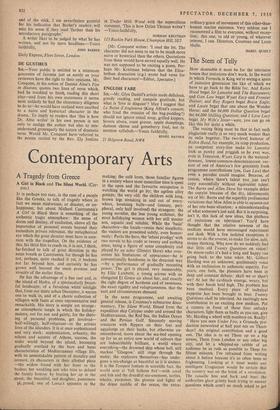Contemporary Arts
A Tragedy from Greece
A Girl in Black and The Silent World. (Cur- zon.)
IT is perhaps too easy, in the case of a people like the Greeks, to talk of tragedy where in fact we mean misfortune, or disaster, or un- happiness; but about Michael Cacoyannis's A Girl in Black there is something of the authentic tragic atmosphere: the sense of doom and destiny, of exaltation, above all the importance of personal events beyond their immediate private relevance, the metaphorical eye which the great director must have in com- mon with the tragedian. On the evidence of this, his third film to reach us, it is, not, I think, far-fetched to talk of great direction in the same breath as Cacoyannis, for though he has not, perhaps, quite reached it yet, it beckons not far beyond him, and certainly he has grown well beyond the mere promise and vivacity of the earlier films.
He has the advantage of a fine cast and, in the island of Hydra, of a spectacularly beauti- ful landscape; of a ferocious white sunlight that, from our misty urban December, it warms one to walk in, and of a choric collection of villagers with faces at once representative and remarkable. His story is simple yet strange: an atmospheric tangle in which the holiday- makers, out for sun and gaiety, for the shelv- ing of personal problems, get involved- half-willingly, half-reluctant—in the private lives of the islanders. It is at once sophisticated and very stark : sophistication, urbanity, the echoes and accents of Athens, success, the wider world beyond the island, becoming gradually overlaid by the bare and basic characteristics of Mediterranean village life, with its unmistakable pattern of morality and censure, its characters in their allotted place —the widow found with her lover in the bushes; her weakling son who tries to defend the family honour by beating her up in the street; the beautiful, sad daughter, passionate yt, proud. one of Lorca's spinsters in the making; the café louts, those familiar figures in a society where most masculine time is spent in the open and the favourite occupation is watching the world go by; the ageless alley gossips; the very old; the children with long, brown legs streaking in and out of every- where, bouncing balls—and (uneasy, peri- pheral, only half involved) the strangers: the young novelist, the less young architect, the stout holidaying woman with her still stouter son, aquatic and voluble. While the 'basic' characters—the locals—retain their simplicity, the visitors are presented subtly, even humor- ously: Pavia the hero, the 'infant prodigy' with two novels to his credit at twenty and nothing since, being a figure of some complexity and played by an actor (Dimitri Horn) who over- comes his limitations of appearance—he is conventionally handsome in the dreariest way —by a performance of gradually mounting power. The girl is played, very memorably, by Ellie Lambetti, a young actress with an elongated El Greco air about her, and exactly the right degree of hardness and of sweetness, the exact rigidity and voluptuousness, that the part and circumstances demand.
In the same programme, and awaiting general release, is Cousteau's submarine docu- mentary, The Silent World, filmed from the expedition ship Calypso under and around the Mediterranean, the Red Sea, the Indian Ocean and the Persian Gulf. Sinuously moving creatures with flippers on their feet and aqualungs on their backs, but otherwise un- encumbered, move about the sea-bed opening up for us an entire new world of colours that are indescribably brilliant, a world where everything—the drowned ship whose bell, still marked 'Glasgow,' still rings through the water; the explorers themselves—has under- gone a sea-change as beautiful as it is sinister. It is the Tempest fantasy•in scientific fact, the world seen at 'full fathom five'—with coral and fish and the dreadful sea-anemone, turtles, whales, porpoises, the gloom and lights of the degse middle of the ocean, the extra- ordinary grace of movement of this other-than- human marine existence. Very seldom can I recommend a film to everyone, without excep- tion: this one, to old or young, of whatever interest, I can. Directors. Cousteau and Louis Malle.


































 Previous page
Previous page